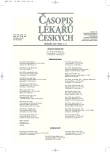Genetic Variability of Cytokines in Relation to the Risk of Post–surgical Complications
Genetická variabilita cytokinů ve vztahu k riziku pooperačních komplikací
Genový polymorfizmus hlavních pro - a protizánětlivých cytokinů, zejména faktoru nekrotizujícího tumory-α, interleukinu (IL)-1ß, IL-6, IL-8 a IL-10, ovlivňuje průběh fyziologické tkáňové reakce na operační trauma. Klinické studie posledních let se snaží prokázat, že genotyp pacienta významně určuje intenzitu pooperační tkáňové odpovědi a výskyt pooperačních komplikací, a je tak nezávislým prognostickým faktorem pooperačního průběhu. Ukazuje se rovněž, že dopad jednotlivých genetických variant může být rozdílný ve vztahu k závažnosti potraumatického SIRS a ve vztahu k tíži a prognóze sepse. Takovéto zjištění může být pro klinika brzy transformováno do stanovení perioperačního rizika – zahrnutí genomového profilu markerů důležitých v zánětlivé, trombotické, cévní a neurologické odpovědi na perioperační stres.
Klíčová slova:
faktor nekrotizující tumory-α, genový polymorfizmus, interleukin-6, pooperační sepse.
Authors:
P. Maruna
Authors‘ workplace:
Ústav patologické fyziologie 1. LF UK, Praha
Published in:
Čas. Lék. čes. 2007; 146: 128-131
Category:
Review Article
Overview
Gene polymorphysm of the principal pro - and anti-inflammatory cytokines, namely that of tumor necrosis factor-α, interleukin (IL)-1ß, IL-6, IL-8 a IL-10, can influence the course of the physiological tissue reaction to operation trauma. Recent clinical studies try to confirm that the patient’s phenotype significantly determines both the intensity of post-surgical tissue response and the incidence of postsurgical complications and therefore it represents an independent prognostic factor of the postsurgical development. It appears that the impact of individual genetic variants can differ in the relation to the seriousness of the posttraumatic SIRS and in the relation to the danger and prognosis of the sepsis. For clinicians, such findings can be soon transformed into the estimation of perisurgical risks – including genome profile of markers critical for the inflammatory, thrombotic, vascular and neurological response to post-surgical stress.
Key words:
tumor necrotising factor-α, gene polymorphysm, interleukin 6, postoperative sepsis.
Labels
Addictology Allergology and clinical immunology Angiology Audiology Clinical biochemistry Dermatology & STDs Paediatric gastroenterology Paediatric surgery Paediatric cardiology Paediatric neurology Paediatric ENT Paediatric psychiatry Paediatric rheumatology Diabetology Pharmacy Vascular surgery Pain management Dental HygienistArticle was published in
Journal of Czech Physicians

- Metamizole at a Glance and in Practice – Effective Non-Opioid Analgesic for All Ages
- Metamizole vs. Tramadol in Postoperative Analgesia
- The Importance of Limosilactobacillus reuteri in Administration to Diabetics with Gingivitis
- The Importance of Hydration in Wound Healing
-
All articles in this issue
- Free Cell Human DNA in Body Fluids – Potential for Clinical Applications
- New antibiotics, efflux pumps and overcoming resistance
- Infection and Systemic Inflammatory Response
- Imported Tropical Infections
- Liver Diseases of the Infectious Aetiology
- Genetic Variability of Cytokines in Relation to the Risk of Post–surgical Complications
- Pathogenic Entamoeba histolytica – A Rare Incidence in Persons Microscopically Positive for Cysts in Faeces
- Infectious Diseases of Drug Users in the Czech Republic
- Chronic Appendicitis – Vanishing or Current Diagnosis?
- Incidence of Thyroid Cancer in Slovakia: Extensive Evidence from One Centre in the Context of National Data
- Wrist Arthroscopy
- Detection of free light chains – A New Method of Diagnostics of Haematological Diseases
- Rhodococcus equi Infection in Subjects Infected with Human Immunodeficiency Virus (HIV)
- Journal of Czech Physicians
- Journal archive
- Current issue
- About the journal
Most read in this issue
- Chronic Appendicitis – Vanishing or Current Diagnosis?
- Pathogenic Entamoeba histolytica – A Rare Incidence in Persons Microscopically Positive for Cysts in Faeces
- Liver Diseases of the Infectious Aetiology
- New antibiotics, efflux pumps and overcoming resistance
